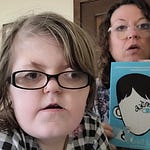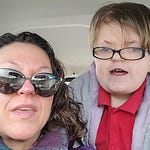Thank you
, , and many others for tuning into my live video with !Mansi and I met on Substack a little over six months ago, and I am in awe of her many gifts. Because of some conversations we’ve shared offline about beauty—what is it, how do we define it, and who gets to decide?—we decided to join our lived experiences in this Live.
If you can spare an hour of your time, I hope you will find it is well worth it. Speaking of time, I genuinely understand how precious it is for each of you, and I don’t take it lightly that you are intentional about spending some significant part of your day here. That fact alone is a gift to me, and I think it’s safe to say for Mansi, too.
In this Live, Mansi opened with her background growing up in Lucknow, India and the societal and familial expectations placed upon her from a young age with multiple outfit changes daily!
Then I shared about the pivotal moment when I first noticed that body size mattered, and that mine was not within the acceptable range. I was ten, and upon returning from my annual well child visit, my mom told me, “Well, you just need to lose some weight, so why don’t you eat a little less?”
Felicity chimed in with her own thoughts about what it’s like growing up as a teen in the midst of a culture of social media beauty influencers. She said:
Social media can also really be hard on teen girls, because it can it sends a message to them that says, oh, you have to look like this person, oh, you have to wear these [certain] clothes or if you don't, you're not pretty…
Mansi and I discussed holding the paradox of not wanting to care about our appearance, yet caring very much about how we look and being honest with our daughters about each of these. We agreed that conversations surrounding beauty and appearance is vital, and that a movement toward “body neutrality” instead of self-deprecation or “body positivity” might be helpful.
Body neutrality is basically where you don’t have to love all of your flaws, but you don’t hate them, either—you simply accept that they exist and are a part of you, a reflection of your life experience and what you have been through.
It’s also a matter of stating that appearance is not the most important aspect of a person and doesn’t have to be the focal point of a relationship or discussion.
What I loved was how Felicity really owned herself in this conversation, and some of what she shared surprised me, only in the sense that I hadn’t heard it before. It’s inspiring to know that our young people are thinking and talking about these issues and that they genuinely care about making positive changes in their generation.
Mansi and I agreed that a follow-up discussion is warranted, especially on the aspect of aging as it pertains to the perception of beauty—both one’s personal viewpoint and the perception of others, society at large, even. Also the differences between aging men and aging women play into this topic.
It was a delight to share from our hearts about this subject. Thanks for joining us. We appreciate you.














Share this post